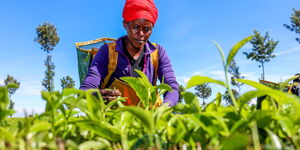Used carrier bags have found their way into the market, especially in low income areas of Nairobi.
The disposable bags, which flooded the market following the government's ban on plastic carrier bags, are now being washed are re-sold to unsuspecting Kenyans.
The recycled bags are first collected from dumpsites in the city, after which they are sorted according to size and colour, and then washed in the polluted Nairobi and Ngong Rivers.
According to a report by the Standard, the process is carried out by women from the city's informal settlements as they try to fend for their families.
The bags pose a health risk to users since they are washed with contaminated water that habours bacteria and industrial waste.
Collins Lando, a Public Health expert, in his conversation with the Standard, says that “there are high chances of contamination if the recycled bags are used to keep foodstuff."
He warns that this contamination can lead to an outbreak of diseases such as cholera or typhoid since the rivers in Nairobi are polluted with all kinds of waste.
The recycled bags have found their way to popular markets including Gikomba, Muthurwa and Toi, which attract high number of shoppers.
One of the women involved in the trade narrated to the publication how they wake up early to collect the bags from the dumpsites before washing them, packaging in bundles and distributing them to the market.
“We wake up very early to collect the carrier bags. Then we wash and sort them according to sizes and colours before packing them in bundles,” she narrated.
She disclosed that she was introduced to the business by her sister, who has been doing it since 2017, in February this year.
The bags retail for as low as Ksh1 while the heavy duty ones start from Ksh6 per piece.
The bags pose a health danger to users even as the World Health Organisation (WHO) lists cholera as a global threat.
According to a WHO report, an estimated 1.3 to 4 million cases of cholera and 21,000 to 143,000 deaths are recorded annually.












